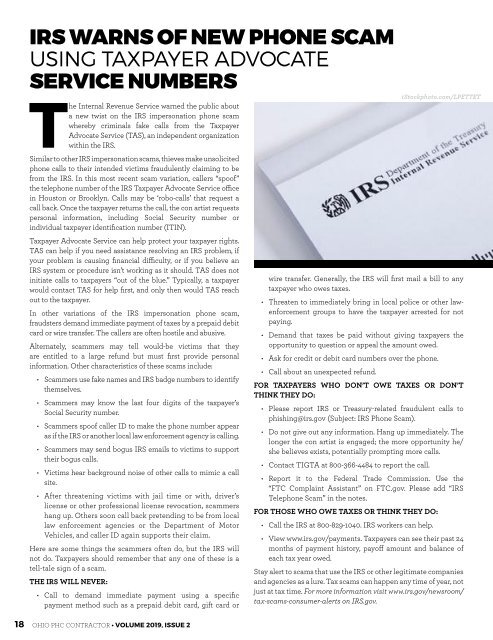Ohio PHC Contractor Volume 2019 Issue 2
You also want an ePaper? Increase the reach of your titles
YUMPU automatically turns print PDFs into web optimized ePapers that Google loves.
IRS WARNS OF NEW PHONE SCAM<br />
USING TAXPAYER ADVOCATE<br />
SERVICE NUMBERS<br />
The Internal Revenue Service warned the public about<br />
a new twist on the IRS impersonation phone scam<br />
whereby criminals fake calls from the Taxpayer<br />
Advocate Service (TAS), an independent organization<br />
within the IRS.<br />
Similar to other IRS impersonation scams, thieves make unsolicited<br />
phone calls to their intended victims fraudulently claiming to be<br />
from the IRS. In this most recent scam variation, callers “spoof”<br />
the telephone number of the IRS Taxpayer Advocate Service office<br />
in Houston or Brooklyn. Calls may be ‘robo-calls’ that request a<br />
call back. Once the taxpayer returns the call, the con artist requests<br />
personal information, including Social Security number or<br />
individual taxpayer identification number (ITIN).<br />
Taxpayer Advocate Service can help protect your taxpayer rights.<br />
TAS can help if you need assistance resolving an IRS problem, if<br />
your problem is causing financial difficulty, or if you believe an<br />
IRS system or procedure isn’t working as it should. TAS does not<br />
initiate calls to taxpayers “out of the blue.” Typically, a taxpayer<br />
would contact TAS for help first, and only then would TAS reach<br />
out to the taxpayer.<br />
In other variations of the IRS impersonation phone scam,<br />
fraudsters demand immediate payment of taxes by a prepaid debit<br />
card or wire transfer. The callers are often hostile and abusive.<br />
Alternately, scammers may tell would-be victims that they<br />
are entitled to a large refund but must first provide personal<br />
information. Other characteristics of these scams include:<br />
• Scammers use fake names and IRS badge numbers to identify<br />
themselves.<br />
• Scammers may know the last four digits of the taxpayer’s<br />
Social Security number.<br />
• Scammers spoof caller ID to make the phone number appear<br />
as if the IRS or another local law enforcement agency is calling.<br />
• Scammers may send bogus IRS emails to victims to support<br />
their bogus calls.<br />
• Victims hear background noise of other calls to mimic a call<br />
site.<br />
• After threatening victims with jail time or with, driver’s<br />
license or other professional license revocation, scammers<br />
hang up. Others soon call back pretending to be from local<br />
law enforcement agencies or the Department of Motor<br />
Vehicles, and caller ID again supports their claim.<br />
Here are some things the scammers often do, but the IRS will<br />
not do. Taxpayers should remember that any one of these is a<br />
tell-tale sign of a scam.<br />
THE IRS WILL NEVER:<br />
• Call to demand immediate payment using a specific<br />
payment method such as a prepaid debit card, gift card or<br />
wire transfer. Generally, the IRS will first mail a bill to any<br />
taxpayer who owes taxes.<br />
• Threaten to immediately bring in local police or other lawenforcement<br />
groups to have the taxpayer arrested for not<br />
paying.<br />
• Demand that taxes be paid without giving taxpayers the<br />
opportunity to question or appeal the amount owed.<br />
• Ask for credit or debit card numbers over the phone.<br />
• Call about an unexpected refund.<br />
FOR TAXPAYERS WHO DON’T OWE TAXES OR DON’T<br />
THINK THEY DO:<br />
• Please report IRS or Treasury-related fraudulent calls to<br />
phishing@irs.gov (Subject: IRS Phone Scam).<br />
• Do not give out any information. Hang up immediately. The<br />
longer the con artist is engaged; the more opportunity he/<br />
she believes exists, potentially prompting more calls.<br />
• Contact TIGTA at 800-366-4484 to report the call.<br />
• Report it to the Federal Trade Commission. Use the<br />
“FTC Complaint Assistant” on FTC.gov. Please add “IRS<br />
Telephone Scam” in the notes.<br />
FOR THOSE WHO OWE TAXES OR THINK THEY DO:<br />
• Call the IRS at 800-829-1040. IRS workers can help.<br />
iStockphoto.com/LPETTET<br />
• View www.irs.gov/payments. Taxpayers can see their past 24<br />
months of payment history, payoff amount and balance of<br />
each tax year owed.<br />
Stay alert to scams that use the IRS or other legitimate companies<br />
and agencies as a lure. Tax scams can happen any time of year, not<br />
just at tax time. For more information visit www.irs.gov/newsroom/<br />
tax-scams-consumer-alerts on IRS.gov.<br />
18 OHIO <strong>PHC</strong> CONTRACTOR • VOLUME <strong>2019</strong>, ISSUE 2


















